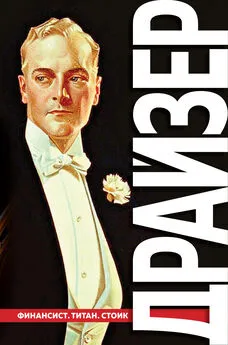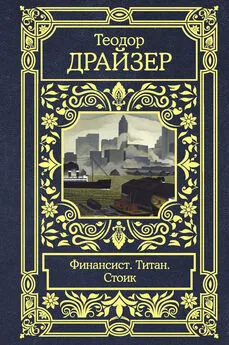Теодор Драйзер - Финансист / The Financier
- Название:Финансист / The Financier
- Автор:
- Жанр:
- Издательство:неизвестно
- Год:2022
- Город:Москва
- ISBN:978-5-17-147929-9
- Рейтинг:
- Избранное:Добавить в избранное
-
Отзывы:
-
Ваша оценка:
Теодор Драйзер - Финансист / The Financier краткое содержание
Текст сопровождается комментариями и словарем, облегчающим чтение.
Предназначается для продолжающих изучать английский язык (уровень 4 – Upper-Intermediate).
В формате PDF A4 сохранён издательский дизайн.
Финансист / The Financier - читать онлайн бесплатно ознакомительный отрывок
Интервал:
Закладка:
“We hadn't thought of the hammock because of the neighbors, but it would be nice,” agreed Mrs. Cowperwood. “Henry will have to get one.”
“I have two or three over at the hotel. My servants make them down there. I'll send Manuel over with them in the morning.”
He tweaked Edward's ear, told Joseph, the second boy, he would bring him an Indian tomahawk, and went back into the house.
“This is the lad that interests me,” he said, after a time, laying a hand on the shoulder of Frank. “What did you name him in full, Henry?”
“Frank Algernon.”
“Well, you might have named him after me. There's something to this boy. How would you like to come down to Cuba and be a planter, my boy?”
“I'm not so sure that I'd like to,” replied the eldest.
“Well, what have you against it?”
“Nothing, except that I don't know anything about it.”
“What do you know?”
The boy smiled wisely. “Not very much, I guess.”
“Well, what are you interested in?”
“Money!”
“Aha! Well, that's a good trait. And you speak like a man, too! We'll talk more about that later. Nancy, you're breeding a financier here, I think. He talks like one.”
He looked at Frank carefully. There was real force in that sturdy young body – no doubt of it. Those large, clear gray eyes were full of intelligence. They indicated much and revealed nothing.
“A smart boy!” he said to Henry. “I like him. You have a bright family.”
Henry Cowperwood smiled dryly. This man, if he liked Frank, might do much for the boy. He might eventually leave him some of his fortune. He was wealthy and single.
Uncle Seneca became a frequent visitor to the house – he and his negro bodyguard, Manuel, who spoke both English and Spanish, much to the astonishment of the children; and he took an increasing interest in Frank.
“When that boy gets old enough to find out what he wants to do, I think I'll help him to do it,” he observed to his sister one day; and she told him she was very grateful. He talked to Frank about his studies, and found that he cared little for books. Grammar was an abomination. Literature was silly. Latin was of no use. History – well, it was fairly interesting.
“I like bookkeeping and arithmetic,” the boy observed. “I want get to work. That's what I want to do.”
“You're pretty young, my son,” observed his uncle. “How old are you? Fourteen?”
“Thirteen.”
“Well, you can't leave school before sixteen. You'll do better if you stay until seventeen or eighteen. It can't do you any harm. You won't be a boy again.”
“I don't want to be a boy. I want to get to work.”
“Don't go too fast, son. You'll be a man soon enough. You want to be a banker, do you?”
“Yes, sir!”
“Well, when the time comes, if everything is all right and you've behaved yourself and you still want to, I'll help you get a start in business. If I were you and were going to be a banker, I'd first spend a year or so in some good grain and commission house [13] grain and commission house – хлебно-комиссионная контора
. You'll learn a lot that you ought to know. And, meantime, keep your health and learn all you can.”
He gave the boy a ten-dollar gold piece with which to start a bank-account.
Chapter III
When young Cowperwood was thirteen, he entered into his first business venture. Walking along Front Street one day, he saw an auctioneer's flag hanging out before a wholesale grocery [14] a wholesale grocery – оптово-бакалейный магазин
and from the interior came the auctioneer's voice:
“What am I bid for this exceptional lot of Java coffee, twenty-two bags all told, which is now selling in the market for seven dollars and thirty-two cents a bag wholesale? What am I bid? The whole lot must go as one. What am I bid?”
“Eighteen dollars,” suggested a trader standing near the door. Frank paused.
“Twenty-two!” called another.
“Thirty!” a third.
“Thirty-five!” a fourth, and so up to seventy-five, less than half of what it was worth.
“I'm bid seventy-five! I'm bid seventy-five!” called the auctioneer, loudly. “Any other offers? Going once at seventy-five; am I offered eighty? Going twice at seventy-five, and” – he paused, one hand raised dramatically. Then he brought it down with a slap in the palm of the other – “sold to Mr. Silas Gregory [15] Silas Gregory – Сайлас Грегори
for seventy-five. Make a note of that, Jerry,” he called to his red-haired, freckle-faced clerk beside him. Then he turned to another lot of grocery staples.
Young Cowperwood was making a rapid calculation. If, as the auctioneer said, coffee was worth seven dollars and thirty-two cents a bag in the open market, and this buyer was getting this coffee for seventy-five dollars, he was making then and there eighty-six dollars and four cents. As he recalled, his mother was paying twenty-eight cents a pound.
He drew nearer, and watched these operations closely. The starch, as he soon heard, was valued at ten dollars a barrel, and it only brought six. Some kegs of vinegar were knocked down at one-third their value, and so on. He began to wish he could bid; but he had no money, just a little pocket change. The auctioneer noticed him standing almost directly under his nose, and was impressed with the stolidity – solidity – of the boy's expression.
“I am going to offer you now a fine lot of Castile soap – seven cases, no less – which, as you know, if you know anything about soap, is now selling at fourteen cents a bar. This soap is worth anywhere at this moment eleven dollars and seventy-five cents a case. What am I bid? What am I bid? What am I bid?”
He was talking fast in the usual style of auctioneers, with much unnecessary emphasis; but Cowperwood was not impressed. He was already rapidly calculating for himself. Seven cases at eleven dollars and seventy-five cents would be worth just eighty-two dollars and twenty-five cents; and if it went at half – if it went at half —
“Twelve dollars,” commented one bidder.
“Fifteen,” bid another.
“Twenty,” called a third.
“Twenty-five,” a fourth.
“Twenty-six.”
“Twenty-seven.”
“Twenty-eight.”
“Twenty-nine.”
There was a pause.
“Thirty,” observed young Cowperwood, decisively.
The auctioneer looked at him curiously and almost incredulously but without pausing. He had, somehow, in spite of himself, been impressed by the boy's peculiar eye; and now he felt, without knowing why, that the boy had the money. He might be the son of a grocer.
“I'm bid thirty! I'm bid thirty! I'm bid thirty for this fine lot of Castile soap. It's a fine lot. It's worth fourteen cents a bar. Will any one bid thirty-one? Will any one bid thirty-one? Will any one bid thirty-one?”
“Thirty-one,” said a voice.
“Thirty-two,” replied Cowperwood. The same process was repeated.
“I'm bid thirty-two! I'm bid thirty-two! I'm bid thirty-two! Will anybody bid thirty-three? It's fine soap. Seven cases of fine Castile soap. Will anybody bid thirty-three?”
Young Cowperwood's mind was working. He had no money with him; but his father was teller of the Third National Bank, and he could quote him as reference [16] he could quote him as reference – он мог на него сослаться
. He could sell all of his soap to the family grocer, surely; or, if not, to other grocers. Other people were anxious to get this soap at this price. Why not he?
The auctioneer paused.
“Thirty-two once! Am I bid thirty-three? Thirty-two twice! Am I bid thirty-three? Thirty-two three times! Seven fine cases of soap. Am I bid anything more? Once, twice! Three times! Am I bid anything more?” – his hand was up again – “and sold to Mr.—?” He leaned over and looked curiously into the face of his young bidder.
“Frank Cowperwood, son of the teller of the Third National Bank,” replied the boy, decisively.
“Oh, yes,” said the man, fixed by his glance.
“Will you wait while I run up to the bank and get the money?”
“Yes. Don't be gone long. If you're not here in an hour I'll sell it again.”
Young Cowperwood made no reply. He hurried out and ran fast; first, to his mother's grocer, whose store was within a block of his home.
Thirty feet from the door he slowed up, put on a nonchalant air, and strolling in, looked about for Castile soap. There it was, the same kind, displayed in a box and looking just as his soap looked.
“How much is this a bar, Mr. Dalrymple [17] Dalrymple – Дэлримпл
?” he inquired.
“Sixteen cents,” replied that worthy.
“If I could sell you seven boxes for sixty-two dollars just like this, would you take them?”
“The same soap?”
“Yes, sir.”
Mr. Dalrymple calculated a moment.
“Yes, I think I would,” he replied, cautiously.
“Would you pay me today?”
“I'd give you my note for it. Where is the soap?”
He was perplexed and somewhat astonished by this unexpected proposition on the part of his neighbor's son. He knew Mr. Cowperwood well – and Frank also.
“Will you take it if I bring it to you today?”
“Yes, I will,” he replied. “Are you going into the soap business?”
“No. But I know where I can get some of that soap cheap.”
He hurried out again and ran to his father's bank. It was after banking hours; but he knew how to get in, and he knew that his father would be glad to see him make thirty dollars. He only wanted to borrow the money for a day.
“What's the trouble, Frank?” asked his father, looking up from his desk when he appeared, breathless and red faced.
“I want you to loan me thirty-two dollars! Will you?”
“Why, yes, I might. What do you want to do with it?”
“I want to buy some soap – seven boxes of Castile soap. I know where I can get it and sell it. Mr. Dalrymple will take it. He's already offered me sixty-two for it. I can get it for thirty-two. Will you let me have the money? I've got to run back and pay the auctioneer.”
His father smiled.
“Why, Frank,” he said, going over to a drawer where some bills were, “are you going to become a financier already? You're sure you're not going to lose on this? You know what you're doing, do you?”
“You let me have the money, father, will you?” he pleaded. “Just let me have it. You can trust me.”
He was like a young hound on the scent of game. His father could not resist.
“Why, certainly, Frank,” he replied. “I'll trust you.” And he counted out six five-dollar certificates of the Third National's own issue and two ones. “There you are.”
Frank ran out of the building and returned to the auction room as fast as his legs would carry him. When he came in, sugar was being auctioned. He made his way to the auctioneer's clerk.
“I want to pay for that soap,” he suggested.
“Now?”
“Yes. Will you give me a receipt?”
“Yes.”
“Do you deliver this?”
“No. No delivery. You have to take it away in twenty-four hours.”
That difficulty did not trouble him.
“All right,” he said, and pocketed his paper testimony of purchase.
The auctioneer watched him as he went out. In half an hour he was back with a drayman – an idler was waiting for a job.
Читать дальшеИнтервал:
Закладка:
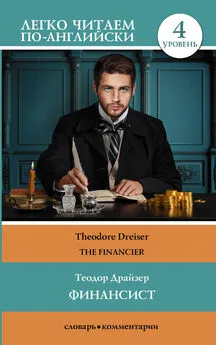

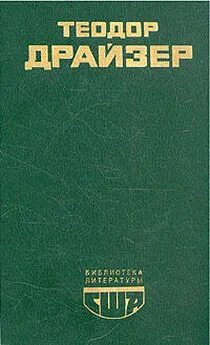

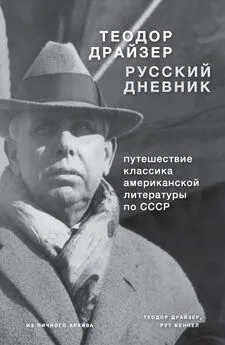
![Теодор Драйзер - Финансист. Титан. Стоик. «Трилогия желания» в одном томе [сборник litres]](/books/1143540/teodor-drajzer-finansist-titan-stoik-trilogiya.webp)
